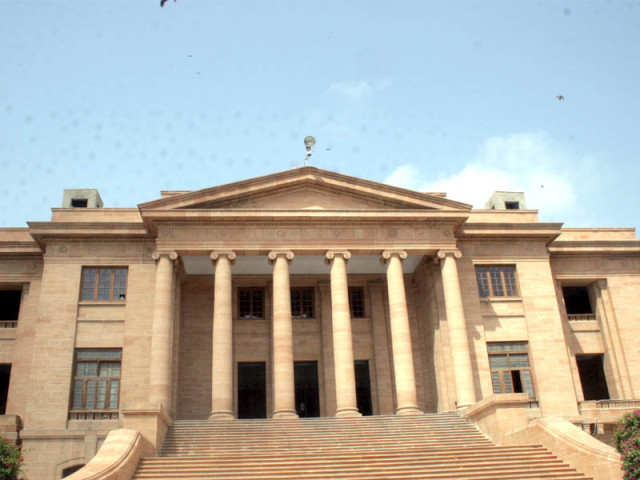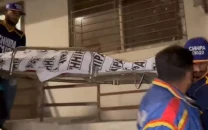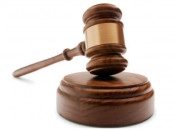Sindh advocate-general granted time for arguments in JIT reports' publication case
SHC bench directs govt law officer to argue on plea on Jan 10 next year

PHOTO: EXPRESS
A two-judge bench, headed by Justice Naimatullah Phulpoto, directed the AG to argue on the plea on January 10, 2018 when the matter will be taken up again.
The bench was hearing an application moved by Pakistan Tehreek-e-Insaf's Ali Haider Zaidi, who had sought an early hearing on his petition to publicise reports of the joint investigation teams (JITs) based on interrogations of former Lyari kingpin Uzair Baloch, Baldia factory fire incident suspects and others.
At the outset, an additional AG said that AG Barrister Zamir Ghumro wanted to argue on the matter, but he was unable to do so as he was busy before the Supreme Court.
The petitioner's lawyer, Barrister Omar Soomro, contended that the government law officer was seeking time again and again, as the government just wanted to delay the matter.
However, allowing the request, the bench directed AG Ghumro to argue on the matter on January 10, 2018.
Home department's refusal
Last week, the provincial home department had informed the court that reports of inquiries into high-profile criminal activities should not be made public, as doing so could adversely affect the state endeavours to prosecute and get criminals convicted by courts.
JIT reports be made public
Filing comments, the home secretary had maintained that investigations of criminal cases were carried out under the relevant provisions of the Code of Criminal Procedure, 1898.
"[Disclosure of JIT reports may] jeopardise the whole process of investigation, prosecution and fair trial as information obtained from one source could be countered or altered from another source like forensic evidence etc," the home secretary maintained, adding that it could also be misused by any person to the detriment of the canons of justice and fair play.
The home secretary had argued that the case of Baldia factory fire was under trial in the competent court of law. He said the report of the investigation officer submitted to the trial court forms the basis of the case of the prosecution, adding that the information, if any, other than that, does not carry the status of the prosecution's case.
He had maintained that the only report of the criminal case submitted by the investigation officer (challan) is a public document. "The recordings of the JIT may at times not be substantiated by other valid investigation measures or reports or statements," he argued.
SHC grants more time to file comments in JIT reports' publication case
"Therefore, making them public might jeopardise the court proceedings and adversely affect the state's endeavour to prosecute and get the criminals convicted by the court of law through a just process of the law," he argued.
He said that the contents of the petition were based on hearsay and public rhetoric without any semblance of evidentiary value. The contention of the petitioner is not covered by the law, he added.
However, it was maintained that if any other plea was made, then the home secretary may be given due time and a chance to submit his version. Therefore, the court was pleaded to dismiss the petition as being baseless and devoid of merit.
Contesting the plea, Additional AG Ghulam Mustafa Mahesar had contended that the petitioner had no locus standi to file the petition as he was not an aggrieved party in those high-profile cases. He alleged that the petitioner, Zaidi, had filed the petition as a publicity stunt.
Model Town case
On the other hand, the petitioner's lawyer, Barrister Soomro, had argued that the Punjab government had also taken a similar stance in a case relating to the publication of the report of judicial inquiry into the Model Town incident. However, the Lahore High Court rejected the government's stance and ordered the government make the findings public and ultimately the same was done.
Complete JIT report on Sharifs' offshore properties
Soomro said the petitioner's only contention was to publicise the reports of the JITs formed to probe into the Baldia factory fire incident and crimes of Uzair and former chief of Pakistan Fishermen Cooperative Society, Nisar Morai.
Case history
Zaidi had approached the court against the provincial chief secretary for not providing reports compiled by the JITs that had investigated the Baldia factory fire incident, alleged crimes of Uzair and cases against Morai, under the Sindh Transparency and Right to Information Act, 2011.
He had filed a petition in October, days after the police had filed Uzair's confessional statement recorded before a judicial magistrate, in which he had made startling disclosures of committing criminal activities in connivance with the senior leadership of the Pakistan Peoples Party (PPP) and police officers.
PML-N bins JIT report as a ‘piece of trash’
The gangster had named former president and PPP Co-Chairperson Asif Ali Zardari, his sister MNA Faryal Talpur, Senator Yousuf Baloch, former senator Faisal Raza Abidi, former provincial minister Sharjeel Inam Memon, former Karachi city police chief Waseem Ahmed, SSP Farooq Awan, his brother Prosecutor-General Shahadat Awan, and others as his collaborators in the statement.
In the petition, Zaidi argued that the Sindh Transparency and Right to Information Act, 2011 had been passed by the Sindh Assembly, which granted him the right to obtain information in line with the Act. The PTI leader claimed that he requested the chief secretary multiple times to provide copies of the JIT reports but the respondent failed to provide the required information.
The petitioner said families of the victims of the Lyari gang war, Baldia factory fire and those aggrieved by crimes committed by Morai deserved justice. However, due to the concealment of the JIT reports, the families were unaware of the culprits involved in these crimes.
"The publication of the JIT reports is important to ensure that the true culprits are not able to evade justice," Zaidi argued, citing that the print and electronic media had reported that during investigations, the JITs obtained evidence of the involvement of various politicians in these crimes.
SHC seeks govt's reply on petition seeking publication of JIT reports
The PTI leader had argued that it was imperative that the politicians involved in crimes are brought to the book. However, he apprehended that as long as the JIT reports were kept secret, the involvement of these politicians in crimes will not be known to the public, leaving the politicians to quietly exercise their influence and quash any investigation launched against them.
"The publication of the JIT reports is important as there are allegations that state machinery was utilised to commit and cover up crimes and the people have a right to know if public resources were used for this purpose," Zaidi argued.
The petitioner also said that the very purpose of constituting JITs, which were formed to uncover the truth of these crimes, will be defeated if the reports were not released.



















COMMENTS
Comments are moderated and generally will be posted if they are on-topic and not abusive.
For more information, please see our Comments FAQ